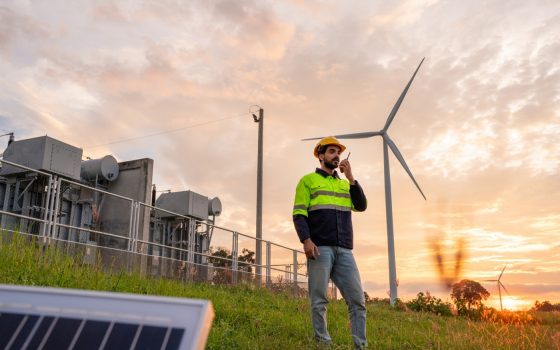Central banks should lead by example on transparency and climate change
Over 50 NGOs have called on central banks to walk the talk when it comes to transparency and tackling climate change.
05 June 2018
In a letter drawn up by the New Economics Foundation, more than 50 NGOs, including Greenpeace, Finance Watch, Transparency International, and Share Action, have called on central banks to lead by example when it comes to financial transparency over the risks and implications of climate change.
The letter notes that G20 central banks and finance ministries have made commendable steps by putting climate change firmly on the financial stability agenda. As Governor of the Bank of England Mark Carney has suggested, the severity of climate risks could result in a “climate Minsky moment”, involving system-wide collapse in prices as companies in the fossil fuel industry rapidly lose their value.
A successful green transition means re-aligning finance and capital to a more ecologically sustainable footing. However, it also means deflating potentially the biggest asset price bubble in history: the ‘carbon bubble’.
Forecasts suggest that only one quarter of remaining fossil fuel reserves can be burned if we are to keep to the Paris Climate Agreement and stop temperatures rising above 2°C. Leaving most of the world’s oil, gas and coal in the ground means carbon intensive assets may be grossly overpriced, and infrastructure built to extract the reserves may become useless (known as ‘stranded assets’).
Climate change and deflating the carbon bubble has the potential to wipe out trillions of pounds worth of assets
Climate change and deflating the carbon bubble has the potential to wipe out trillions of pounds worth of assets, making the devastation of the 2008 financial crisis seem like a walk in the park.
In response to the risks, G20 central banks and finance ministries have established the Task Force on Climate-Related Financial Disclosures (TCFD). Taking the first meaningful stride towards addressing the financial risks of climate change, the TCFD has developed a voluntary, consistent reporting framework for climate-related financial disclosures.
According to Governor Carney, climate risks and opportunities are currently “shrouded in secrecy”, and the more transparent we make markets, “the more we will all benefit”. In theory, greater transparency will allow the market to price-in risks of climate change, enabling better long-term decisions.
However, whilst there are some notable success stories, best practice has not yet been established, either for companies or for banks. Indeed, following reports that the UK’s largest pension funds fail to sufficiently consider climate change, a group of MPs have called on government to make climate-related risk disclosures mandatory by 2022.
Until then, private financial sector institutions need an authoritative example for how to report TCFD disclosure recommendations, to help tackle the foot-dragging that would accompany leaving it to the market.. Central banks are well-placed to spearhead this movement.
As the 50 NGOs writing to the FT have argued, central banks should lead by example given that they have themselves built up portfolios of corporate securities that are highly skewed towards the carbon intensive sector. As the Bank of England is a public sector institution, this means the government’s balance sheet is also significantly exposed to potential climate related risks.
Can we really expect private institutions to voluntarily, publicly disclose their business strategies and risk exposures to climate change while leading public institutions are unwilling to do so?
It also begs a simple question: Can we really expect private institutions to voluntarily, publicly disclose their business strategies and risk exposures to climate change while leading public institutions are unwilling to do so?
Improving central bank transparency may be an essential first step, but it must also be the thin end of a larger policy wedge. For example, the Bank of England’s own corporate quantitative easing (QE) programme acts as a subsidy for carbon intensive sectors and risks reinforcing the current ‘carbon lock-in’ of energy systems centred upon fossil fuels, which endangers financial stability and undermines the Paris Agreement on climate change.
With this letter we are asking for central banks to be responsible and lead by example. By increasing their transparency and disclosing their climate-related risks, the long-term hope must be that central banks will ultimately redesign their QE programmes in order to help clean up their balance sheet. And ultimately this will hopefully mean that central banks start to think more strategically about how they can support the green transition and Paris Climate commitments.
With 50 key NGOs now united and calling for central banks to act, Mark Carney must ensure that the UK continues to lead the way on tackling climate change.
Full list of signatories of the letter
ATTAC Norge
ATTAC Ireland
Banktrack
Better Europe Public Affairs
Christian Aid
Conseil Scientifique de la Fondation pour la Nature et L’Homme
Climate Strategy and Partners
Cogito
Corporate Europe Observatory
Debt Resistance UK
Next Systems Project — Democracy Collaborative
E3G
Ecopreneur
European Environment Bureau
European Alternatives
European initiative for a Finance-Climate Pact
Finance Innovation Lab
Finance Watch
Friends of the Earth England, Wales and Northern Ireland
Friends of the Earth Europe
German Watch
Global Justice Now
Global Forest Coalition
Global Sustainability Institute, Anglia Ruskin University
Global Witness
Global Warning
Green Budget Europe
Green Economy Coalition
Greenpeace
International Institute for Law and the Environment
Institute Veblen
International Trade Union Confederation
Jubilee Debt Foundation
Leave it in the Ground Initiative (LINGO)
New Economics Foundation
NOAH — Friends of the Earth Denmark
Notre affaire à tous
Oikos
Positive Money (UK)
Positive Money (EZ)
Profundo
Purposeful Money
Rethinking Economics
Royal Society for the encouragement of Arts, Manufactures and Commerce
Share Action
Social Value UK
SolarAid
SOMO
Stamp Out Poverty
Transparency International
Transparency Task Force
World Future Council
Topics Banking & finance Climate change






